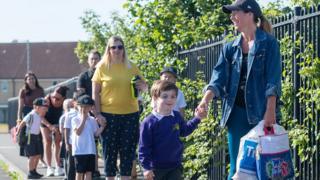 Image copyright
PA Media
Image copyright
PA Media
The plan for all primary school years in England to go back to school before the end of term is to be dropped by the government.
There had been an aim for all primary pupils to spend four weeks in school before the summer break.
But it is no longer thought to be feasible and instead schools will be given "flexibility" over whether or not to admit more pupils.
Head teachers' leaders said it had never been a practical possibility.
It comes after Health Secretary Matt Hancock conceded at Monday's Downing Street briefing that secondary schools in England may not fully reopen until September "at the earliest".
Prime Minister Boris Johnson will chair a cabinet meeting later to discuss the next steps to ease lockdown restrictions, before Education Secretary Gavin Williamson delivers a statement to the House of Commons on the reopening of schools.
There are separate rules for managing the threat of coronavirus in England, Wales, Scotland and Northern Ireland.
Children in England began returning to primary schools in a phased process last week, with Reception, Year 1 and Year 6 pupils heading back first.
Mr Williamson will give an indication later of how many more pupils in England have returned, but he is also expected to say that primary schools will no longer have to prepare for the return of all pupils, as previously proposed by the government.
Instead schools will have the option to increase numbers - but it will be up to them to decide whether they can bring in more classes and will take away the "pressure" to get ready.
The announcement will mean that many children in these other year groups will not be back in school until September.
Head teachers had warned several weeks ago that it was not a realistic possibility to accommodate all primary year groups at the same time, with social distancing limiting their capacity.
Class sizes are now only 15 pupils or less - so if each class occupied two classrooms, school leaders argued that they would have no space for all year groups to return.
"The 'ambition' to bring back all primary year groups for a month before the end of the summer term was a case of the government over-promising something that wasn't deliverable," said Geoff Barton, leader of the ASCL head teachers' union.
"It isn't possible to do that while maintaining small class sizes and social bubbles, so we aren't surprised that the policy has been jettisoned," he said.
Paul Whiteman, of the National Association of Head Teachers, said "we're pleased to see the government will not force the impossible" and that the plan had too many "practical barriers".
Schools have remained open throughout the lockdown for children of key workers and vulnerable children.
But last Monday primary schools began the process of inviting back another two million children across three year groups.
Secondary pupils in Years 10 and 12 are to begin returning for some sessions in school from 15 June.
It is thought that primary pupil numbers have been increasing as parents have become more confident - but there have also been local concerns about different regional rates of infection.
Teachers' unions have warned that it is too early to return to school - and some local authorities have delayed a return to school in their areas.
But the Department for Education has argued that children need to get back to lessons - and that safety has been "paramount" in the plans to bring back more pupils.
Schools in Wales will reopen from 29 of June to all age groups for limited periods during the week, while Scottish schools are to reopen at the start of the autumn term on 11 August, with some continued home-learning.
Some Northern Irish pupils preparing for exams and those about to move to post-primary schools will go back in late August, with a phased return for the rest in September.
The UK has recorded its lowest daily rise in the number of coronavirus deaths since before lockdown on 23 March, according to the latest government figures.
A further 55 people died after testing positive with the virus as of 17:00 BST on Sunday, taking the total to 40,597.
There tends to be fewer deaths reported on Mondays - due to a reporting lag over the weekend.
The figures came as a study estimated lockdowns have saved more than three million lives from coronavirus in Europe.
Researchers from Imperial College London used computer models to predict the spread of the virus if no restrictions had been put in place in 11 European countries, finding that the "death toll would have been huge" without lockdown.
In the UK, the lockdown prevented 470,000 deaths up to 4 May, according to the study.